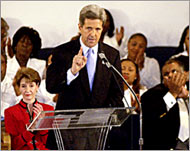God and the US presidential election
During a 2000 Republican presidential primary debate, then Texas Governor George Bush cited Jesus Christ as his favourite political philosopher.

The 2000 Democratic nominee, then Vice-President Al Gore, told a reporter that he often asked himself: “What would Jesus do?” when making political decisions.
In a recent Gallup poll, 64% of registered voters said their personal religious beliefs would be important in determining their vote for president this year.
While the majority of Americans believe in the separation of church and state, they also believe religion has a significant role to play in presidential elections, according to experts in Washington.
More than 90% of Americans believe in God in one form or another and many equate religious faith with morality and social values, said Clyde Wilcox, a professor of government at Georgetown University.
“A majority of Americans are religious in some way and many take religion as their most important value,” Wilcox said.
Core values
Consequently, he said, voters often filter issues and candidates through the prism of their religious beliefs.
“It plays a pretty big role in most people’s votes,” he said.
Yet the interplay between religion and politics in presidential campaigns does not mean citizens are less adamant about maintaining equal but separate roles for religion and government.
According to a recent Zogby poll, 59% of American adults support the institutional separation of church and state and 76% disapprove of religious leaders endorsing political candidates.
“What this is saying is that we don’t want the government to tell religion what to do … but it doesn’t mean that people don’t want religious values to influence policy options,” Wilcox said.
Balance
Most voters want candidates who contemplate religious faith, but largely reject those who do not strike an appropriate balance, he said.
|
“Religion is going to be one of the major issues in this election” Welton Gaddy, president of the Interfaith Alliance |
“I think today that if a candidate said: ‘I’ll do what the Pope says,’ they would lose the election pretty handily,” he said. “But, if they said that ‘my faith informs my values,’ the public likes that.”
Such thinking is not lost on the candidates in this year’s race for the White House.
“Religion is going to be one of the major issues in this election,” said Welton Gaddy, president of the Interfaith Alliance, a DC-based advocacy group that promotes the role of religious faith in civic life.
Christian right
The Bush re-election team views the solidification of support from the Christian right as one of the keys to victory, while both the president and the de facto Democratic nominee John Kerry will try to court Catholic, Jewish and Muslim swing voters in battleground states such as Florida and Michigan.
 |
|
President George Bush (L) prays |
For Bush, the campaign strategy is clear: keep the base happy.
Largely, that means espousing issues that are important to conservative evangelical Christians such as a constitutional ban on gay marriage and a pro-life stance on abortion, political experts say.
At a recent panel discussion sponsored by the Interfaith Alliance, Clarence Paige, a Washington correspondent for the Chicago Tribune, said gay marriage, viewed by many as a wedge issue, would likely galvanise the religious conservatives whose support Bush needs to win re-election.
“The fervour over gay marriage now has re-energised the religious right, making them a factor this year,” Paige said.
Conservative voters
Roughly half the nation’s religious adherents are Christian Protestants, according to Frank Newport, editor-in-chief of the Gallup Poll. Those who attend church services once a week tend to be conservative voters, polling data shows.
“Highly religious white Protestants are significantly more likely to vote for Bush than any other voters,” Newport said.
To stay in the White House, Bush will need to placate socially conservative Christians while not alienating moderate Protestant and Catholic swing voters by drifting too far to the right, experts say.
Karl Rove, Bush’s chief political strategist, believes victory can be achieved by convincing Christian conservatives to vote in large numbers, Gaddy said.
“He [Rove] has said to his workers that ‘if we mobilise the religious right, we will win this election,'” he said.
Liberal left
For John Kerry the challenge is less straightforward.
Despite the perception by some that liberal Democrats are more secular and less likely to be swayed by theological rhetoric, Democrats are not averse to religion, as an article published last year in the Washington Monthly pointed out.
 |
|
John Kerry in a Baptist church in |
“While Democratic voters may distrust the religious right, they don’t dislike religion itself,” said writer Amy Lee.
There are religious moderates who could fall into the Democratic camp if Kerry can find a way to use religious language to convey a larger moral vision, something Democrats failed to do in recent elections, Wilcox said.
“One of the things the Democrats have done very badly is abandon the religious language to the Republicans,” he said.
Muslim Americans
The “God gap,” as Wilcox put it, has worked against Democratic candidates who could appeal to religious moderates, particularly Catholic voters, on issues such as poverty and health care by incorporating a faith-based message into their campaign platforms.
Kerry could also pick up votes from Muslim Americans, many of whom were frustrated by the Patriot Act and the Bush administration’s stringent immigration policies following the September 11 attacks in 2001, experts say.
Ultimately, conventional wisdom suggests that no serious presidential candidate can afford to ignore the role of religion in American politics. Neither atheists nor agnostics stand much of a chance in the battle for the White House, Gaddy said.
“I would say in the present environment a candidate cannot be dismissive of the importance of religion in the nation and attract much attention,” he said.